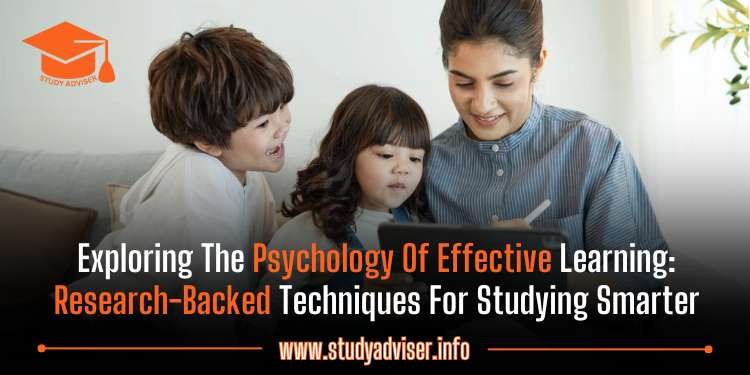Learning is a complex psychological process that is impacted by many factors. As students, our ability to learn effectively is critical to our success in education and life. Understanding the psychology behind learning can provide powerful insights into how we can become better learners.
In this article, we will explore key psychological concepts that influence effective learning. We will look at how memory works, the role of motivation, and research-backed learning techniques. By applying insights from psychology, you can develop study habits that stick and master any subject.
The Brain’s Learning Systems
To learn effectively, we first need to understand the learning process in the brain. When we learn new information, different systems in the brain work together to encode information, consolidate it into long-term memory, and retrieve it later. Researchers have identified two complementary learning systems that drive acquisition and mastery of skills:
Implicit learning system: This system operates automatically, allowing you to gradually pick up patterns and regularities in the information you’re learning. It works intuitively, without you having to consciously think about what you’re learning. An example is learning your multiplication tables through repeated practice questions.
Related: Free online resources for research papers
Explicit learning system: This system involves active thinking and conscious reasoning. It’s what you use when you deliberately apply strategies to learn or problem solve. As an example, creating mnemonic devices to memorize information involves explicit learning.
Research shows that allowing both the implicit and explicit systems to work in parallel results in the most effective learning. Relying too much on one can limit your learning potential.
The Role of Memory
Memory plays a fundamental role in learning. To learn effectively, we need to encode information into memory, store it correctly, and retrieve it later. Researchers distinguish between two core memory systems:
Working memory: The brain’s “mental workspace,” this is where you actively process information from the environment. However, working memory is limited in both capacity and duration. If not consolidated, new information in working memory is lost within 30 seconds.
Long-term memory: This refers to the vast network of encoded information stored semi-permanently for later retrieval. Getting information into long-term memory requires mental effort and repetition over time. Retrieving long-term memories can trigger them to be modified or reconstructed.
Mastering new skills and knowledge involves transferring information from temporary working memory into long-lasting long-term storage. Techniques like distributed practice and self-testing focus directly on building long-term, retrievable memory.
The Motivation Equation
Motivation is a crucial ingredient for effective learning. The expectancy-value theory breaks motivation down into three key components:
Expectancy: Your belief that you can succeed if you put in effort. This is influenced heavily by factors like self-efficacy and your implicit beliefs about learning.
Value: How much you care about doing well in the subject or task. Connecting new material to things you already find interesting increases perceived value.
Cost: What you have to give up to engage in learning. This includes factors like the effort or time commitment required.
Motivation tends to be higher when you expect to succeed, value the material, and view the cost or effort as reasonable. By cultivating positive motivational beliefs, you are likely to put in more effort towards mastering new information.
Research-Backed Learning Techniques
Cognitive and educational psychologists have identified learning techniques that leverage key components of the learning process like memory, dual learning systems, and motivation. Five research-backed learning strategies include:
Spaced Practice Rather than cramming, space out your studying over multiple sessions. This boosts retention by allowing time for memory consolidation and forgetting between sessions. Forgetting actually strengthens memory by ensuring you re-encode and reconstruct memories.
Retrieval Practice Actively test yourself and bring information to mind without relying on materials. Attempting retrieval helps consolidate memories. Mix up how you practice retrieval for fuller learning.
Related: The 10 Best Study Apps for Students
Interleaving When learning multiple topics, mix up the order rather than blocking content together. Interleaving allows you to compare and contrast concepts, strengthening understanding and discrimination.
Concrete Examples Supplement abstract concepts with concrete examples that illustrate key ideas. Vivid examples grab attention, helping anchor ideas in memory by tapping evolutionarily old memory systems.
Elaborative Interrogation
Asking how, why, and what-if questions around material aids deeper processing and links new information to existing knowledge structures. This effortful elaboration strengthens encoding and retrieval routes.
By applying evidence-backed strategies aligned with how our minds learn, you can unlock your learning potential across any subject area. View learning as a training program for your brain!
Developing Effective Study Habits
While knowing learning theories is useful, putting them into practice requires good study habits and skills. Here are four techniques to apply what we know about learning to build effective study habits:
Plan Regular Study Sessions
Space out your studying over multiple brief sessions using a schedule and reminders, consistently revisiting material over time. This builds long-term memories.
Test Yourself
Frequently quiz yourself using practice questions, flashcards, and past exams, without notes, to exercise retrieval pathways. Identify and relearn areas of difficulty.
Connect and Organize
Relate new ideas to what you already know and organize information into coherent structures and visual maps. This strengthens mental models for encoding and recall.
Reflect on Improvement
Reflect on what study strategies work effectively for you across different subjects. Set specific learning goals and track progress over time, adjusting your approach as needed.
By strategically managing your study habits, you can put learning science into practice. Test out evidence-backed strategies and find out which work best for your needs.
Ongoing research continues to reveal insights into the psychology of learning. Our increasing knowledge about how the brain acquires, processes, encodes, and retrieves information holds exciting promise for improving education. As learning theories evolve, the practical application of these principles using strategies like distributed practice and interleaving will empower all students to realize their academic potential and become life-long learners.
